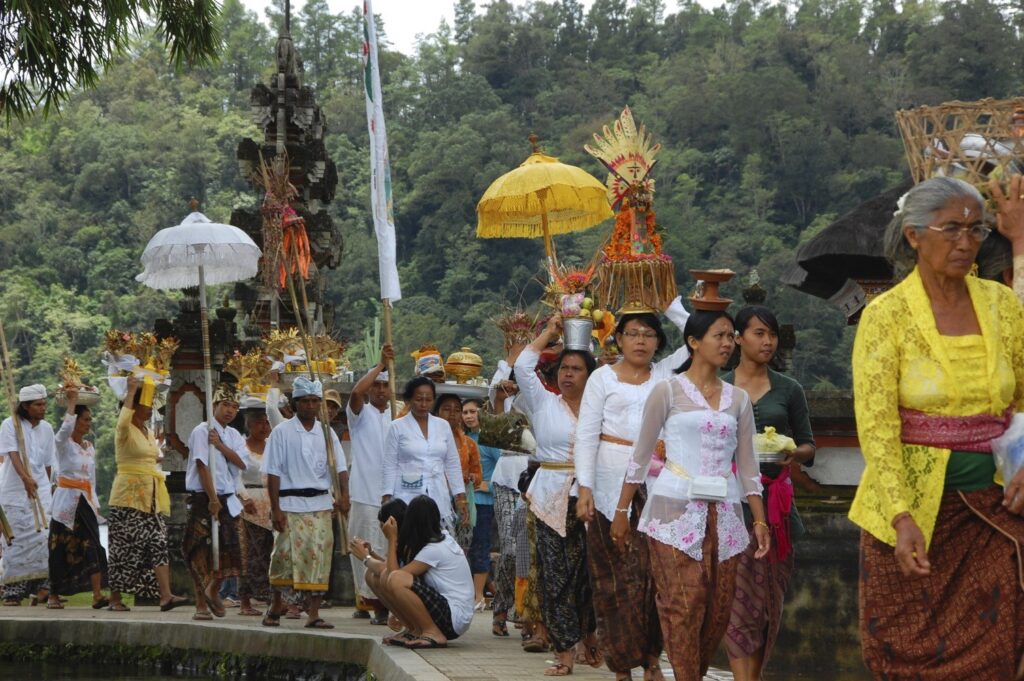Giving in Indonesia

Credit: Rollan Budi from Vancouver, Canada
Licence: cc-by-sa-2.0, via Wikimedia Commons
14 February 2009, 11:21
| Giver: | Other |
|---|---|
| Receiver: | Individual or unstructured/informal group |
| Gift: | Money |
| Approach: | Philanthropy |
| Issues: | 10. Reduced Inequalities |
| Included in: | Gift Economies |
The practice of giving holds a prominent place in Indonesian society. Historically, generosity in Indonesia is rooted in a tradition of mutual cooperation known as gotong-royong, a Javanese term meaning “to bear together.” As citizens of the most populous Muslim nation in the world, many Indonesians practice Zakat, an Islamic law that requires the faithful to donate a portion of their wealth to charitable causes. The Indonesian government is also active in the country’s philanthropic sector, managing the collection and distribution of Zakat while regulating the activities of foreign NGOs.
Indonesians observe gotong-royong as a way to promote shared prosperity. A spirit of reciprocity lies at the heart of gotong-royong, guided by the understanding that all members of a community will contribute whatever they can. The practice of gotong-royong varies by region. In Sumatra mutual aid revolves around the annual harvest, while in South Sulawesi people come together to help a neighbor relocate their house. After Indonesia gained independence in 1945, gotong-royong emerged as a new national ethos, as leaders like Sukarno and Suharto based their social and economic agendas on principles of mutual cooperation.
Following Suharto’s resignation in 1998, Islamic practice began to play a larger role in Indonesia’s philanthropic sector. The early 2000s saw the proliferation of Lembaga Amil Zakat (LAZ), private Zakat management agencies that oversee donations at the regional level. With the passage of new legislation in 2011 and 2014, the Indonesian government began supervising the practice of Zakat through the Badan Amil Zakat (BAZ), a national Zakat collection board.
As Indonesia has become less secular, Islamic principles have spurred more philanthropic activity in the business world. A number of companies have integrated Zakat programs as part of their corporate social responsibility (CSR) goals, while Muslim employee unions have launched Zakat collection drives in the workplace. Areas of focus for both private and public Zakat initiatives include Islamic education, vocational training and healthcare.
In addition to its role managing the BAZ, the Indonesian government maintains strict oversight over the activities of foreign NGOs during disaster recovery. Legislation passed in 2018 requires international organizations to apply for authorization before launching relief operations, and to coordinate their activities with local nonprofits. The law is designed to help strengthen the capacities of Indonesian NGOS, while ensuring that all humanitarian efforts remain under government jurisdiction.
The diversity of private and public giving channels have created a rich philanthropic landscape in Indonesia. For five straight years between 2016 and 2021, the country ranked number one on the World Giving Index list of most generous countries. Shaped by Islamic law, government engagement and the culture of gotong-royong, Indonesian giving offers a model for other countries to emulate in the 21st century.
Contributors: Maha Tazi, Stephen Meyer
| Source type | Full citation | Link (DOI or URL) |
|---|---|---|
| Publication |
Alfitri, Alfitri, “Law of Zakat Management and Non-Governmental Zakat Collectors in Indonesia’, The International Journal of Not-for-Profit Law, 8, no. 2 (2005) |
http://heinonlinebackup.com/holcgi-bin/get_pdf.cgi?handle=hein.journals/ijnpl8§ion=24. |
| Publication |
Latief, Hilman, “Islamic Philanthropy and the Private Sector in Indonesia”, Indonesian Journal of Islam and Muslim Societies, 3, no. 2 (2013): 175–201. |
- |
| Publication |
Al-Matar, Fatima, “Zakat vs. Taxation: The Issue of Social Justice and Redistribution of Wealth”, European Journal of Business, Economics and Accountancy, 3, no. 3 (2015): 119–129. |
- |
| Publication |
Wahyu Triatmo, Agus. “A political ideology of the Indonesian Islamic philanthropy institution : a case study of Suryakarta Beramal foundation”, Indonesian Journal of Islam and Muslim Societies, 10 no. 2, (2020): 353-380 |
- |